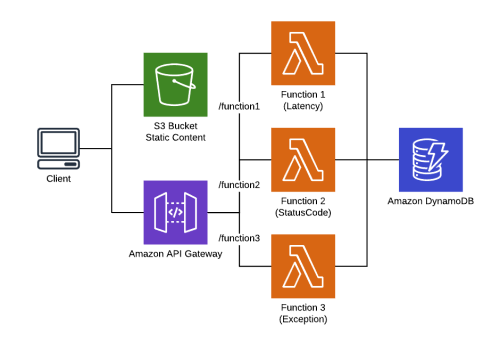This example demonstrates how to use Adrian Hornsby's Failure Injection Layer (https://github.com/adhorn/FailureInjectionLayer) to perform chaos engineering experiments on a serverless environment.
The demo application consists of a simple serverless app containing three different functions behind an API Gateway and a static webpage showing the result of these functions. The functions fetch an url for an image at random from a DynamoDB table. An example can be seen at (https://demo.serverlesschaos.com/). By using the failure injection layer you are able to inject failure to each function and see on the page what happens.
- https://www.youtube.com/watch?v=vKurdrGMFpg
- https://www.youtube.com/watch?v=Cw-JmAJHG-g
- https://www.youtube.com/watch?v=xxogwzUMg7c
This is prepared to be installed using the Serverless Framework (https://serverless.com) and the Finch plugin. Make sure to have the Failure Injection Layer installed in your account (https://github.com/adhorn/FailureInjectionLayer) and an S3 bucket dedicated for the static webpage (the plugin will remove all contents before uploading).
- Clone the repository.
- Install Serverless Framework (if you don't already have it installed).
npm install -g serverless- Install Serverless Finch plugin for deployment of the static webpage.
npm install --save serverless-finch- Create an env.yml file in the root folder based on the env.yml.template contents.
account: <your account number>
bucketName: <your bucket name>
layer: <arn of the lambda layer>
failure_conf: '{"isEnabled": false, "delay": 400, "error_code": 404, "exception_msg": "I failed", "rate": 1}'- Deploy the serverless application using Serverless Framework.
sls deploy --region YOUR_PREFERRED_REGION --stage YOUR_PREFERRED_STAGE- Create an env.js file in the folder ./client/dist/assets/js/ based on the env.js.template contents (located in the same folder) with the endpoints from sls deploy output.
//Enter your API Gateway endpoints for each function here
var function1 = "<function1 api gateway endpoint>";
var function2 = "<function2 api gateway endpoint>";
var function3 = "<function3 api gateway endpoint>";- Deploy the static webpage using Serverless Framework and the Finch plugin.
sls client deploy --region YOUR_PREFERRED_REGION --stage YOUR_PREFERRED_STAGE- Create an dynamodb.json file in the root folder based on the dynamodb.json.template contents. Replace YOUR_DYNAMODB_TABLE_NAME with your DynamoDB table name.
{
"YOUR_DYNAMODB_TABLE_NAME": [
{- Populate the DynamoDB table with data using AWS CLI and the created json file.
aws dynamodb batch-write-item --request-items file://dynamodb.json- Try it out!
This is still a really early version of the app. Features will be added on a regular basis.
- New UI with more visibility
- AWS X-Ray enabled by default
- Variables moved to env.yml (Thanks to Adrian Hornsby)
- Support for the new version of the Failure Injection Layer (Thanks to Adrian Hornsby)
- Initial release
